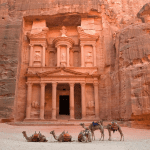Egypt is a land steeped in history, with a vibrant culture that reflects the influences of its ancient civilizations, Islamic heritage, and modern developments. From the majestic pyramids to bustling bazaars, Egypt’s culture and traditions are a testament to its rich past and dynamic present. This article delves into the various facets of Egyptian culture, exploring its historical roots, festive celebrations, culinary delights, artistic expressions, religious practices, fashion trends, and the strong sense of community that binds its people together. Join us on a journey through the vibrant tapestry of Egypt’s cultural tapestry.
Historical Influences on Egyptian Culture
Ancient Egyptian Civilization
The legacy of the pharaohs still shines through in Egyptian culture, from iconic monuments like the pyramids to intricate hieroglyphics that adorn temple walls.
Islamic Period and Arab Conquests
The arrival of Islam in Egypt brought with it a rich tapestry of architectural marvels like mosques and minarets, as well as a strong influence on language, customs, and traditions.
Colonial Era and Modern Influences
From Napoleon’s expedition to British occupation, Egypt’s history of colonial rule has left a mark on its culture. Today, modern influences from around the world blend seamlessly with traditional practices.
Festivals and Celebrations in Egypt
Islamic Festivals
Colourful processions during Ramadan, spirited celebrations of Eid al-Fitr, and the somber observance of Ashura are just a few of the vibrant Islamic festivals that punctuate the Egyptian calendar.
Coptic Christian Celebrations
With a history dating back to the early days of Christianity, Coptic festivals like Christmas, Easter, and the Feast of the Cross offer a glimpse into Egypt’s rich religious heritage.
National Holidays and Special Events
From the commemoration of the 1952 Revolution to the joyous festivities of Sham El-Nessim, Egypt’s national holidays and special events are a reflection of its diverse cultural tapestry.
Traditional Cuisine and Dining Customs
Popular Egyptian Dishes
Delight your taste buds with iconic dishes like koshari, falafel, and mahshi while exploring the culinary delights of Egypt’s vibrant street food scene.
Customs Surrounding Food and Eating
From the etiquette of dining with your hands to the communal spirit of sharing meals with family and friends, Egyptian dining customs are steeped in warmth and hospitality.
Tea and Coffee Traditions
Sip on fragrant mint tea or potent Turkish coffee as you immerse yourself in Egypt’s time-honored traditions of hospitality and socialising over a steaming cup.
Art and Music in Egyptian Society
Ancient Egyptian Art and Hieroglyphics
Marvel at the enduring beauty of ancient Egyptian art, from exquisite tomb paintings to intricate hieroglyphic inscriptions that offer a window into the past.
Contemporary Art and Artists
Explore the vibrant contemporary art scene in Egypt, where talented artists meld tradition with modern techniques to create thought-provoking works that reflect the country’s dynamic cultural landscape.
### Musical Genres and Instruments
From the hypnotic rhythms of traditional Arabic music to the pulsating beats of modern pop, Egypt’s diverse musical heritage is a testament to the country’s deep-rooted love affair with melody and harmony.
Religious Beliefs and Practices in Egypt
Islam in Egyptian Culture
Egypt’s cultural tapestry is woven with the threads of Islam, which plays a central role in the lives of many Egyptians. Daily prayers, fasting during Ramadan, and the celebration of Eid al-Fitr are key pillars of Islamic practice that shape the rhythm of Egyptian life.
Coptic Christianity and its Influence
While Islam is predominant in Egypt, the country also boasts a significant Coptic Christian community. Coptic Christianity has a rich history in Egypt, with its distinctive traditions and practices influencing aspects of Egyptian culture, including music, art, and architecture.
Syncretism and Folk Beliefs
In addition to Islam and Coptic Christianity, Egypt is home to a blend of syncretic beliefs and folk practices that have been passed down through generations. This rich tapestry of beliefs weaves together elements of ancient Egyptian traditions, superstitions, and regional folklore.
Traditional Clothing and Fashion Trends
Historical Garments and Styles
From the iconic galabeya to the intricately embroidered baladi dresses, traditional Egyptian clothing reflects a blend of ancient heritage and regional influences. Garments like the shawl-like kufiyya and the colorful kaftan showcase Egypt’s diverse sartorial history.
Modern Adaptations and Trends
Contemporary Egyptian fashion blends traditional elements with modern aesthetics, with designers drawing inspiration from both ancient attire and global trends. From tailored suits to flowing abayas, Egyptian fashion today is a fusion of innovation and tradition.
Significance of Clothing in Social Contexts
Clothing in Egypt goes beyond mere attire; it serves as a form of cultural expression and social signaling. Traditional garments worn during weddings and religious ceremonies carry deep symbolic meaning, while everyday attire reflects personal style and social status.
Role of Family and Community in Egyptian Culture
Importance of Family Structure
Family lies at the heart of Egyptian society, with strong bonds and interdependence forming the cornerstone of social life. Extended families often live in close proximity, providing a support network that spans generations.
Community Values and Support Systems
Egyptian communities foster a sense of unity and solidarity, with neighbors often regarding one another as extended family members. Concepts of hospitality, respect for elders, and communal responsibility are deeply ingrained in Egyptian cultural values.
Ceremonies and Rituals Celebrating Unity
From traditional weddings and religious festivities to community gatherings and feasts, ceremonies play a pivotal role in celebrating unity and strengthening communal ties in Egypt. These events serve as occasions for joy, bonding, and the reaffirmation of cultural identity.In conclusion, the culture and traditions of Egypt are a colorful mosaic that continues to captivate and inspire people around the world. From the ancient wonders to the modern innovations, Egypt’s heritage remains a beacon of resilience and creativity. As we embrace the diversity and richness of Egyptian culture, we are reminded of the timeless values and traditions that shape this enchanting land. Let the spirit of Egypt’s cultural vibrancy continue to resonate and illuminate our hearts and minds.






